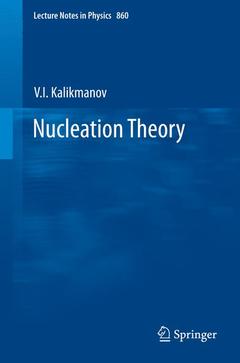Description
Nucleation Theory, 2013
Lecture Notes in Physics Series, Vol. 860
Author: Kalikmanov V.I.
Language: English
Subject for Nucleation Theory:
Keywords
binary nucleation; chemical physics; density functional theory; formation of liquid droplets; macroscopic approach of nucleation; metastable vapor; microscopic approach; microscopic approach of nucleation; microscopic computer simulation; molecular dynamics simulation of nucleation; multi-component nucleation; multi-component nucleation model; non-equilibrium phenomena; nucleation; nucleation theory; phase transition; phase transitions; phenomenological model; semi-microscopic approach; semi-phenomenological theory; single component nucleation model; soft condensed matter physics; theoretical approach nucleation; theory nucleation phenomena
316 p. · 15.5x23.5 cm · Hardback
Description
/li>Contents
/li>Comment
/li>
One of the most striking phenomena in condensed matter physics is the occurrence of abrupt transitions in the structure of a substance at certain temperatures or pressures. These are first order phase transitions, and examples such as the freezing of water are familiar in everyday life. The conditions at which the transformation takes place can sometimes vary. For example, the freezing point of water is not always 0°C, but the liquid can be supercooled considerably if it is pure enough and treated carefully. The reason for this phenomenon is nucleation.
This monograph covers all major available routes of theoretical research of nucleation phenomena (phenomenological models, semi-phenomenological theories, density functional theories, microscopic and semi-microscopic approaches), with emphasis on the formation of liquid droplets from a metastable vapor. Also, it illustrates the application of these various approaches to experimentally relevant problems.
In spite of the familiarity of the involved phenomena, it is still impossible to calculate nucleation accurately, as the properties and the kinetics of the daughter phase are insufficiently well known. Existing theories based upon classical nucleation theory have on the whole explained the trends in behavior correctly. However they often fail spectacularly to account for new data, in particular in the case of binary or, more generally, multi-component nucleation. The current challenge of this book is to go beyond such classical models and provide a more satisfactory theory by using density functional theory and microscopic computer simulations in order to describe the properties of small clusters. Also, semi-phenomenological models are proposed, which attempt to relate the properties of small clusters to known properties of the bulk phases.
This monograph is an introduction as well as a compendium to researchers in soft condensed matter physics and chemical physics, graduate and post-graduate students in physics and chemistry starting on research in the area of nucleation, and to experimentalists wishing to gain a better understanding of the efforts being made to account for their data.
Thermodynamics of a two-phase system.- Classical nucleation theory.- Nucleation theorems.- Density functional theory.- Extended modified drop model and dynamic nucleation theory.- Semi-phenomenological approach: mean-field kinetic nucleation theory.- Computer simulations of nucleation.- Nucleation at high supersaturations.- Argon nucleation.- Binary nucleation - General case.- Binary nucleation with supercritical fluids: coarse-grained nucleation theory.- Multi-component nucleation.- Hetrogeneous nucleation.
Valuable compendium of all major available routes of theoretical research of nucleation phenomena, with emphasis on the formation of liquid droplets from a metastable vapor
First monograph to describe the models bridging macro- and microscopic approaches to nucleation
Covers both single- and multi-component nucleation models
Special focus on molecular dynamics simulation of nucleation, including most advanced simulation methods
Includes supplementary material: sn.pub/extras
These books may interest you

Kinetic Theory of Nucleation 232.80 €

Nucleation of Gas Hydrates 147.69 €

Nucleation of Gas Hydrates 147.69 €

